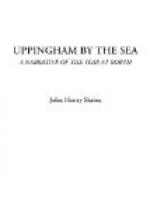Elphin, son of Gwyddno, the prince who ruled the coasts between the Dovey and the Ystwith, came down on a May-day morning to his father’s fishing-weir. All that was taken that morning was to be Elphin’s, had Gwyddno said. Not a fish was taken that day; and Elphin, who was ever a luckless youth, would have gone home empty-handed, but that one of his men found, entangled in the poles of the weir, a coracle, and a fair child in it. This was none other than he who was to be the father of Cymry minstrelsy, and whom then and there his rescuers named Taliesin, which means Radiant Brow. His mother, Ceridwen, seeking to be rid of her infant, but loath to have the child’s blood on her head, had launched him in this sea proof cradle, to take the chance of wind and wave. The spot where he came to land bears at this day the name of Taliesin. On the hill-top above it men show the grave where the bard reposes and “glories in his namesake shore.”
* * * * *
There is something magnetic in a famous site: it attracts again a like history to the old stage. Thirteen centuries and a half after the finding of Taliesin, the same shore became once again an asylum for other outcasts, whose fortunes we propose to chronicle.
But since the day when they drifted to land the cradle of the bard, the waves have ebbed away from Gwyddno’s weir, and left a broad stretch of marsh and meadow between it and the present coast, where stands the fishing village of Borth. The village fringes the sea-line with half a mile of straggling cottages; but the eye is caught at once by a massive building of white stone, standing at the head of the long street, and forming a landmark in the plain. This building is the Cambrian Hotel, reared on a scale that would suggest the neighbourhood of a populous health-resort. But the melancholy silence which haunts its doors is rarely broken, between season and season, by the presence of guests, unless it be some chance sportsman in quest of marsh-fowl, or a land-agent in quest of rents.
When, therefore, on the 15th of March, 1876, a party of four visitors—the Rev. Edward Thring, Headmaster of Uppingham School, one of the Trustees of the school, and two of the masters—were seen mounting the steps of the porch, it was a sight to make the villagers wonder by what chance so many guests came to knock at the door in that dead season. Had the wind blown them hither? It blew a hurricane that day on the bleak coasts of Cardigan Bay; but it was a shrewder storm yet which had swept this windfall to the doors of Borth.
The story must be briefly told. On November 2nd, 1875, Uppingham School was dispersed on account of a fever which had attacked both town and school, not without fatal casualties. On January 28th, 1876, the school met again. In the interval the school-houses had been put in complete sanitary order, and though the efforts made to amend the general drainage of the town had been only on a small and




